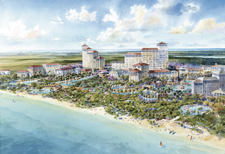How the Chinese-backed project is expected to have a lasting legacy

Baha Mar in the Bahamas is the largest single-phase resort development in the history of the Caribbean. The 1,000-acre, $3.4bn resort, gaming and entertainment complex broke ground on Nassau's Cable Beach in February with a view to opening its doors to guests in 2014. Having signed hotel management deal with some of the world's leading hospitality firms, namely Hyatt Hotels and Morgans, the resort looks well on its way to being completed. Of greatest significance is the source of much of the resort's funding - China.
Following negotiations that began in early 2008, in March last year Baha Mar Resorts signed formal agreements with Export-Import Bank of China and China State Construction and Engineering Corporation. The deal included financing arrangements of $2.5bn with the bank and construction accords designating the Chinese construction firm as the project's general contractor. Additionally, the latter took a minority equity interest in the project.
Speaking at the time, Sarkis Izmirlian, Baha Mar Resorts' chairman and CEO, said financing for such resort developments were “extremely rare”, particularly in this economic climate.
“These agreements mark a critically important day for the Commonwealth of the Bahamas,” he said. “The Baha Mar project will be a great economic boost to the Bahamas. The creation of this unique resort will provide jobs, enhanced revenues, improved skill sets and enhanced infrastructure. It represents a primary stimulus to help bring the Bahamas out of the recession and create better lives for thousands of Bahamians.
“In addition to sharing in the vision for the resort, Baha Mar_s Chinese partners expect the project will help to establish their presence in the North American and Caribbean markets, while showcasing their construction and development capabilities.”
Until the Chinese government opens the gaming market on the mainland, the opportunities to develop casino properties on Chinese soil are limited to Macau - an already highly saturated marketplace. The economic powerhouse has already begun to invest in capital projects throughout the world, seemingly unaffected by the financial problems that have had such a detrimental impact on countries elsewhere. The international gaming industry may prove to be a happy hunting ground.
In July 2010, the Chinese government approved the bank's involvement in the Baha Mar project, which was followed in November by initial approvals from the Bahamian government. In total, the resort is to include 3,500 rooms and residences, the largest casino in the Caribbean, the largest convention centre in the country, a golf course designed by Jack Nicklaus, three spas, a 20-acre water park, restaurants, high-end retail and entertainment venues.
It is hoped the project will revitalise the local economy, which has suffered in recent years due to lower tourism numbers and unemployment. Clearly the positive impact it is expected to have on the economy has been a compelling argument in its favour. Baha Mar is anticipated to create 11,000 jobs, as many as 7,000 of which will be permanent roles at the resort, while also contributing approximately $1bn to the economy in new spending in its first year of operations. Together with improvements to local infrastructure, the developers have also claimed that the resort will raise the annual income for a Bahamian family from $29,000 to $33,500. There are few, if any, casino projects of this scale outside of Asia likely to have as significant an impact upon broader society as this.

